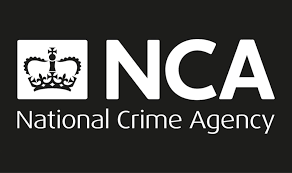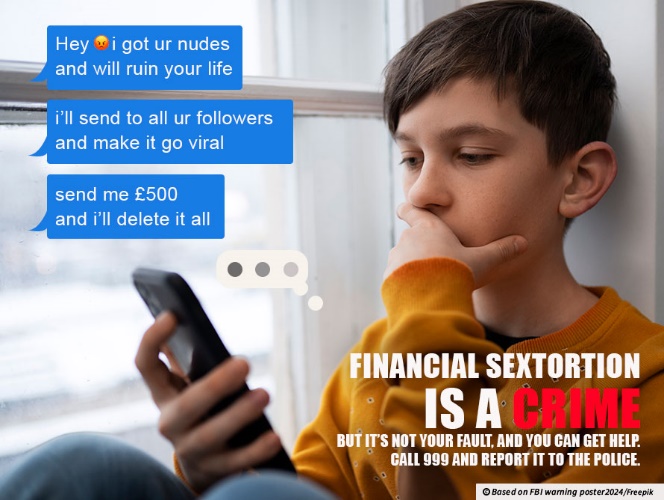Dear Parents and Carers,
 Welcome to another edition of our online safety newsletter looking at the use of technology and how we can work together to keep our children safe. This week the National Crime Agency (NCA) sent information to schools due to an increase in Sextortion techniques. To support you in conversations about this, we have provided some of the information from the NCA.
Welcome to another edition of our online safety newsletter looking at the use of technology and how we can work together to keep our children safe. This week the National Crime Agency (NCA) sent information to schools due to an increase in Sextortion techniques. To support you in conversations about this, we have provided some of the information from the NCA.
Throughout 2022 and 2023, in the UK and internationally, there has been an increase in reporting of ‘Financially Motivated Sexual Extortion’– often referred to as ‘sextortion’.
Although victims of any age are potential targets, children aged 15–17 years and adults aged 18-30 are particularly at risk.
What is Sextortion?
Sextortion can refer to a variety of offences committed online. It is most often used to describe online blackmail, where criminals threaten to release sexual/indecent images of you, unless you pay money or do something else to benefit them.
Sextortion may be:
 Financial blackmail using sexual / indecent images that have been sent to somebody you’ve had contact with online.
Financial blackmail using sexual / indecent images that have been sent to somebody you’ve had contact with online.- Financial blackmail using images that have been stolen from you, taken through hacking, or have been faked using AI generators or other image altering technology.
- Blackmail using sexual/indecent images that have been sent to somebody, but with a demand for something other than money. This might be a demand for you to do something you don’t want to, like give them use of your bank account.
Recognising Sextortion
While victims of Sextortion may feel distressed or blame themselves, they have been tricked or deceived in some way - it is not their fault. These threats are often committed by organised criminals motivated only by money. It does not matter if an image was initially shared with your consent or through threats or manipulation - the misuse of your image is an offence and is never OK.
Typical signs of sextortion attempts may include:
They’re moving too fast. They try to develop a relationship with you very quickly. They might be flirty, tell you they like you very early on, or ask for sexual / indecent images. Some may even send a sexual / indecent image to you first.
They pressure you to do things you’re not comfortable with. They may repeatedly ask you to do sexual things you don’t feel comfortable with. It’s never ok for someone to ask you to do things you don’t want to and there are places you can get help.
They might tell you they’ve hacked you or that they have access to your contacts. Some blackmailers might tell you they’ve got images or information about you from your device. They might threaten to share this information unless money is given to them.
What to do if you’re a victim of sextortion
If this has happened to you, it is not your fault and there is help and support available.
Pause - Stop all communication with the offender immediately.
You may be tempted to pay, but there is no guarantee that this will stop the threats. The offender’s motive is to get money. Once you have shown you can pay, they will likely ask for more and the blackmail may continue.
Preserve evidence. Take screenshots of the offender’s profile information. Save messages and images, and make a note of usernames, email addresses, phone numbers or bank account numbers. If your images have been shared online, collect URLs and links if you can.
Report - Report the incident to your local police force by calling 101.
Under 18’s can report sextortion, or any other form of online child sexual abuse, to their local police force by calling 101, or to the NCA’s CEOP Safety Centre.
However, we understand you may find it difficult to report this type of crime, so it may help you to talk to someone first. Especially if you are having any suicidal thoughts.
The impact that this type of crime can have is severe. Don’t keep it in, seek support either from school or use online systems like;
Report Remove - for young people to confidentially report sexual images and videos of themselves, for help to remove them from the internet.
Childline – free, confidential support online and over the phone for young people under 19.
As a school, we are committed to working with parents to keep children safe online. If you have any questions relating to staying safe online, please contact Helen Kerr, Deputy Head and Designated Safeguarding Lead or John Roberts, Director of Learning for Computing and Business and strategic lead for the use of ICT in school.